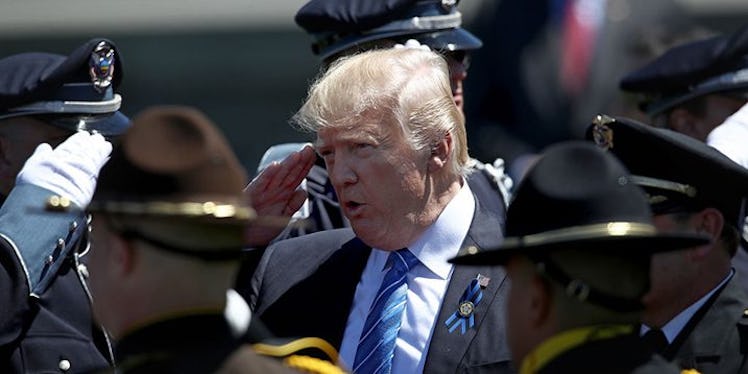
Trump's Ban On Trans People In The Military Is In Confusing Legal Standing
For those appalled by President Donald Trump indicating transgender people will not be allowed to serve the military "in any capacity," the next question to ask might be obvious: Could a ban on trans people in the military get overturned? The answer is that it's hard to tell.
One reason is because Trump's "decision" doesn't seem to exactly be one. The announcement, via Twitter, was informal. No official White House statement followed the president tweets, and the Department of Defense, which heads the American armed forces, seemed to have been unprepared to take questions on Trump's statement, according to The Guardian.
The same goes for the Senate Armed Services Committee.
Meanwhile, The Guardian reports Trump's Secretary of Defense, James Mattis, is on vacation.
The bottom line? There haven't been exact terms drawn out to define this "ban" -- or, at least, not any terms released to the public.
So, the question of whether such a ban could get overturned revolves around, at this point, two questions. First, will Trump actually follow up with a formal ban? Second, would the courts uphold such a ban?
Regarding the first question, there are a couple of things to consider. The chairman of the Senate Armed Services Committee, Senator John McCain, already voiced his opposition to hastily imposing a ban.
Secretary Mattis, for his part, had asked for time to review the subject of recruiting transgender military personnel, according to the Washington Post. Meanwhile, Gen. Joseph Dunford, the chairman of the Joint Chiefs of Staff, (aka the highest ranking military officer) said the military has no issue with current members who are transgender, according to the Washington Examiner.
At the very least, statements from armed services leaders in Washington differ strongly with Trump's words on Wednesday, and those leaders are exactly who the president would have to work with in order to put together a new policy on transgender recruits.
Those statements are reason to at least doubt that such a ban is coming as imminently as Trump's tweets made it seem.
As for the legality of a ban, again, that's a more complicated issue to address. When President Trump imposed a travel ban, there were similar signs of a lack of cohesion with other federal department. However, there was at least an executive order made, and reading the order made it easier to predict its fate.
Predictions are harder to make this time around because there is no official language outlining the ban.
One thing's for sure, however. The ban will be challenged. The American Civil Liberties Union (ACLU), as ever, has indicated that it's prepping for a legal battle.
Plus, the fact that all signs point to Trump trying to impose a ban unilaterally (i.e. without trying to permanently write it into law with the help of Congress) makes the idea of a ban much more vulnerable.
Exactly how vulnerable the ban would be is the question, though. For the answer, we'll have to wait for more news to come.